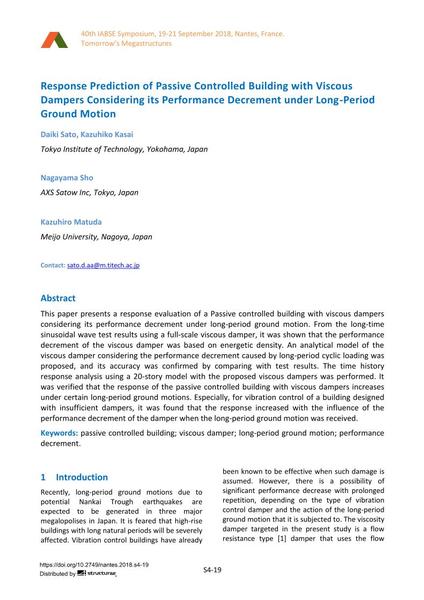Response Prediction of Passive Controlled Building with Viscous Dampers Considering its Performance Decrement under Long-Period Ground Motion

|
|
|||||||||||
Détails bibliographiques
| Auteur(s): |
Daiki Sato
(Tokyo Institute of Technology, Yokohama, Japan)
Kazuhiko Kasai (Tokyo Institute of Technology, Yokohama, Japan) Nagayama Sho (AXS Satow Inc, Tokyo, Japan) Kazuhiro Matuda (Meijo University, Nagoya, Japan) |
||||
|---|---|---|---|---|---|
| Médium: | papier de conférence | ||||
| Langue(s): | anglais | ||||
| Conférence: | IABSE Symposium: Tomorrow’s Megastructures, Nantes, France, 19-21 September 2018 | ||||
| Publié dans: | IABSE Symposium Nantes 2018 | ||||
|
|||||
| Page(s): | S4-19 | ||||
| Nombre total de pages (du PDF): | 8 | ||||
| DOI: | 10.2749/nantes.2018.s4-19 | ||||
| Abstrait: |
This paper presents a response evaluation of a Passive controlled building with viscous dampers considering its performance decrement under long-period ground motion. From the long-time sinusoidal wave test results using a full-scale viscous damper, it was shown that the performance decrement of the viscous damper was based on energetic density. An analytical model of the viscous damper considering the performance decrement caused by long-period cyclic loading was proposed, and its accuracy was confirmed by comparing with test results. The time history response analysis using a 20-story model with the proposed viscous dampers was performed. It was verified that the response of the passive controlled building with viscous dampers increases under certain long-period ground motions. Especially, for vibration control of a building designed with insufficient dampers, it was found that the response increased with the influence of the performance decrement of the damper when the long-period ground motion was received. |
||||
